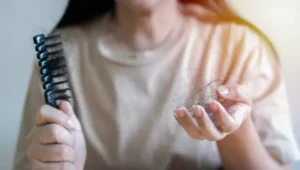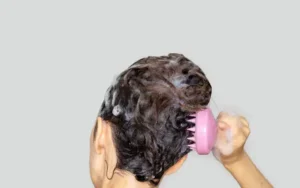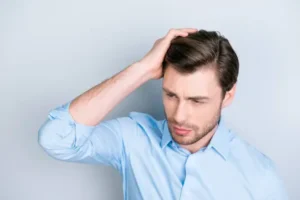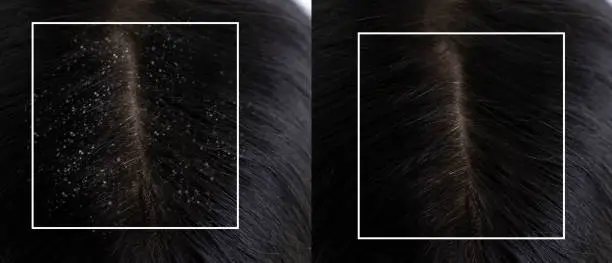Dandruff Treatment Tips 2025?
Dandruff is a common scalp condition that affects millions of people worldwide. It manifests as flaky, white or yellowish skin that sheds from the scalp, and it can cause embarrassment, itching, and irritation. While dandruff is not a serious medical condition, it can be persistent and difficult to treat if not properly addressed.
Fortunately, advancements in dermatology, scalp care products, and home remedies have provided various options to effectively manage and treat dandruff.
we will explore the most effective dandruff treatment tips for 2025, including the latest shampoos, treatments, lifestyle changes, and natural remedies. Whether you suffer from mild dandruff or more severe symptoms like an itchy and inflamed scalp, these tips will help you regain control over your scalp health and leave you with a healthier, flake-free scalp.
Understanding Dandruff: What Causes It?
Before diving into dandruff treatments, it’s important to understand what causes this condition. Dandruff is the result of an imbalance in the scalp, often related to one or more of the following factors:
Malassezia Yeast Overgrowth
Malassezia is a type of yeast that naturally lives on the scalp and feeds on oils produced by the hair follicles. In some cases, an overgrowth of Malassezia yeast can irritate the scalp, leading to inflammation and excessive shedding of skin cells, which presents as dandruff.
Dry Scalp
A dry scalp is a common cause of dandruff. When the scalp lacks moisture, the skin becomes flaky and itchy. Dry air, winter months, and harsh hair products can exacerbate this condition, leading to visible flakes.
Seborrheic Dermatitis
Seborrheic dermatitis is a more severe form of dandruff and involves redness, itching, and inflammation along with the flakes. This condition is caused by a combination of yeast overgrowth and the body’s inflammatory response, and it often requires targeted treatment.
Psoriasis
Psoriasis is an autoimmune condition that leads to the rapid production of skin cells. These skin cells accumulate on the scalp and form thick, silvery scales that can look similar to dandruff.
Contact Dermatitis
Contact dermatitis occurs when your scalp reacts to certain hair products or ingredients, such as fragrances, preservatives, or chemicals. This can result in irritation, itching, and flaking.
Hormonal Imbalance
Hormonal fluctuations, particularly those caused by puberty, pregnancy, or menopause, can increase oil production on the scalp, leading to dandruff. Stress, which can also disrupt hormones, is another contributing factor.
Poor Diet and Hygiene
A diet lacking essential nutrients such as zinc, B vitamins, and healthy fats can contribute to dandruff. Poor scalp hygiene, or infrequent washing, can allow oil and dead skin cells to build up on the scalp, worsening dandruff symptoms.
Dandruff Treatment Tips for 2025

Use Anti-Dandruff Shampoos with Active Ingredients
In 2025, anti-dandruff shampoos will be more advanced and tailored to different causes of dandruff. Look for shampoos with active ingredients that address your specific type of dandruff.
Zinc Pyrithione
Zinc pyrithione is one of the most effective ingredients in anti-dandruff shampoos. It has antifungal and antibacterial properties, which help reduce the yeast overgrowth responsible for dandruff. Popular shampoos containing zinc pyrithione include Head & Shoulders and Selsun Blue.
Ketoconazole
Ketoconazole is an antifungal agent that targets the root cause of dandruff—Malassezia yeast. It is particularly effective for individuals with seborrheic dermatitis or persistent dandruff. Nizoral is a widely recommended shampoo with ketoconazole.
Coal Tar
Coal tar has been used for decades to treat scalp conditions like dandruff and psoriasis. It works by slowing down the production of skin cells and reducing flakes and inflammation. While it is effective, it can have a strong odor and may stain light-colored hair.
Salicylic Acid
Salicylic acid helps to exfoliate the scalp, removing dead skin cells and reducing flakiness. It’s particularly beneficial for those with dry scalp or mild dandruff. Shampoos like Neutrogena T/Sal are formulated with salicylic acid.
Tea Tree Oil
Tea tree oil is a natural antifungal ingredient that has gained popularity in the treatment of dandruff. It helps soothe the scalp, reduce itching, and control yeast overgrowth. Many shampoos, including those from Paul Mitchell and Maple Holistics, incorporate tea tree oil.
Maintain Scalp Hygiene

Regularly washing your hair and scalp is essential for managing dandruff. Clean hair removes excess oil, dead skin cells, and any buildup of hair products that may contribute to dandruff. In 2025, scalp-focused hygiene routines are gaining attention, and more specialized shampoos and scalp scrubs are available.
Shampoo Frequently
For those with oily scalps or seborrheic dermatitis, daily shampooing may be necessary to control dandruff. However, if you have a dry scalp, washing your hair 2-3 times a week should be sufficient to avoid over-drying the scalp.
Massage the Scalp
Gently massaging the scalp with your fingertips while washing your hair can help loosen flakes and improve blood circulation to the scalp. Be sure to use gentle motions to avoid irritation.
Avoid Scratching
While it’s tempting to scratch an itchy scalp, doing so can damage the skin, lead to further irritation, and even introduce bacteria. Use a soothing anti-itch treatment instead to calm the scalp.
Incorporate Scalp Treatments
Scalp treatments, including oils, serums, and exfoliants, are great for targeting dandruff and improving scalp health. In 2025, there are more options than ever for these treatments.
Exfoliate the Scalp
Exfoliating the scalp once a week can help remove dead skin cells and prevent flakes from accumulating. You can use a dedicated scalp scrub or create your own using ingredients like sugar or salt mixed with coconut oil.
Scalp Oils
Certain oils can help hydrate the scalp, reduce inflammation, and promote healthy skin. For example, coconut oil is known for its antifungal properties, while argan oil can soothe and hydrate the skin. Apply a small amount of oil to the scalp before washing your hair for added moisture. Dandruff Treatment Tips 2025?
Apple Cider Vinegar Rinse
Apple cider vinegar has antifungal and antibacterial properties that can help balance the pH of the scalp and reduce dandruff. Mix one part apple cider vinegar with two parts water and use it as a rinse after shampooing.
Consider Professional Treatments

If over-the-counter treatments aren’t providing relief, it may be time to seek professional help. Dermatologists in 2025 are equipped with the latest tools to treat severe dandruff or scalp conditions. Dandruff Treatment Tips 2025?
Steroid Creams
For individuals with seborrheic dermatitis or psoriasis, dermatologists may prescribe topical steroid creams to reduce inflammation and control itching. These should be used sparingly and under professional supervision.
Light Therapy
Light therapy, including ultraviolet (UV) light treatments, is gaining popularity for treating scalp conditions. This type of therapy targets the skin’s immune response, helping to reduce inflammation and flaking.
Prescription Medications
If your dandruff is linked to an underlying condition like eczema or psoriasis, your doctor may prescribe oral medications, such as antifungals or corticosteroids, to manage the condition.
Diet and Lifestyle Changes
While dandruff is primarily a scalp condition, your diet and lifestyle can play a significant role in preventing or exacerbating dandruff. Make sure to:
Eat a Balanced Diet
A diet rich in vitamins and minerals can promote a healthy scalp. Ensure that you’re getting enough zinc, vitamin B6, omega-3 fatty acids, and biotin, which support scalp health and reduce inflammation.
Stay Hydrated
Dehydration can lead to a dry scalp and exacerbate dandruff. Aim to drink at least eight glasses of water a day to keep your scalp hydrated and reduce dryness.
Manage Stress
Stress can trigger flare-ups of dandruff, especially in individuals with seborrheic dermatitis. Incorporating stress management techniques such as meditation, yoga, or deep breathing exercises can help alleviate the impact of stress on your scalp health.
Avoid Harsh Hair Products
Certain hair products, such as those with strong fragrances, alcohol, or harsh chemicals, can irritate the scalp and worsen dandruff. Look for shampoos, conditioners, and styling products that are sulfate-free and designed for sensitive scalps.
Frequently Asked Questions (FAQ) About Dandruff Treatment
What is the best shampoo for dandruff?
The best shampoo for dandruff depends on the cause of your dandruff. If you have a fungal infection (such as seborrheic dermatitis), shampoos with ketoconazole, zinc pyrithione, or selenium sulfide can be effective. For a dry scalp, opt for shampoos with hydrating ingredients like glycerin or tea tree oil.
How can I get rid of dandruff naturally?
Natural remedies like coconut oil, tea tree oil, apple cider vinegar, and aloe vera are often used to manage dandruff. They have antifungal, soothing, and hydrating properties that can help balance the scalp and reduce flakes.
Can dandruff be cured permanently?
While dandruff cannot always be permanently cured, it can usually be managed with proper treatment. With consistent care, including the use of medicated shampoos, lifestyle changes, and proper scalp hygiene, dandruff can be controlled and minimized.
Does diet affect dandruff?
Yes, a poor diet lacking essential nutrients such as zinc, omega-3 fatty acids, and vitamins B6 and B12 can worsen dandruff. A well-balanced diet supports healthy skin and may help reduce dandruff symptoms.
Is dandruff contagious?
No, dandruff is not contagious. It is a common scalp condition caused by factors such as yeast overgrowth, dry skin, or sensitivity to certain hair products.

